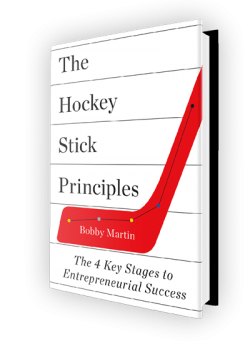In which convincing buyers of your value proposition is maddening…and what to do about it.
When researching The Hockey Stick Principles, I felt that the founder of software firm Sageworks, Brian Hamilton, was the most profound with his explanations for startup challenges. Especially thoughtful was his analogy for how difficult it is to convince customers of your new idea:
“Let’s say it’s the year 1300 in Europe, and an entrepreneur is selling a new invention, the spoon. He goes up to a man holding a bowl of soup to his mouth about to sip it and shows him how great it is to use a spoon instead. But the guy asks him, ‘What hand do I hold it in? Can I hold it with two hands? Why is it round? Can I eat spaghetti with it? Why can’t you make it work with spaghetti?’”
Can you imagine inventing the spoon and knowing the potential it has for mankind, and getting this reaction from prospective buyers? Maddening. From my experiences, potential buyers focus on what your solution doesn’t provide instead of what your product does provide.
In 1999, when I started an industry research firm, First Research, I discovered this quagmire first-hand. “Why doesn’t First Research also provide details about companies?” my first prospects would ask. I had to decide whether to add information about companies, or not. I decided to ignore their advice and press on.
About half of the potential buyers didn’t agree with my vision because their personality was one that didn’t adjust well to new ideas. The other half always offered legitimate feedback and were a bit more thoughtful during their rejection. But during the initial process, I felt a lot like that spoon salesman.
Here are two tips to help you when you get this feedback, which I might add, is inevitable.
1. Don’t overreact to advice. What if the inventor of the spoon overreacted to the advice about it not working with spaghetti and over-engineered it to work with spaghetti, but not nearly as well with soup? A lot of founders make this mistake; they try to be all things to all people and lose their focus and the simple brilliance of their invention. So, I’d be very slow to jump just because someone says, “jump.”
2. Don’t run from the advice, either. One of the biggest mistakes entrepreneurs can make is to look down on this kind of reaction to their products. The discomfort of such negative reactions can also lead some entrepreneurs to retreat from doing this invaluable person-to-person outreach. We love our products, which in turn can make us arrogant about them and make us think that their value ought to be perfectly clear. We can find ourselves assuming that potential customers who aren’t interested are just fools, which often leads to staying on one course, pushing the same product in the same way for much too long. Sometimes, our inventions do need supplementary features that make them more valuable.
The bottom line is this: You have to properly balance the fine line between making product changes based upon feedback or not. If you’re too stubborn, you’ll probably not succeed. If you’re too open-minded and gullible, you’ll lose focus and probably not succeed. I think the right answer often comes from the founder’s gut instincts and sixth sense for business.
Sign up to get more great insights directly to your inbox.
As a special bonus, you'll also immediately get access to my inside analysis of what made 172 diverse companies achieve take-off revenue growth.

